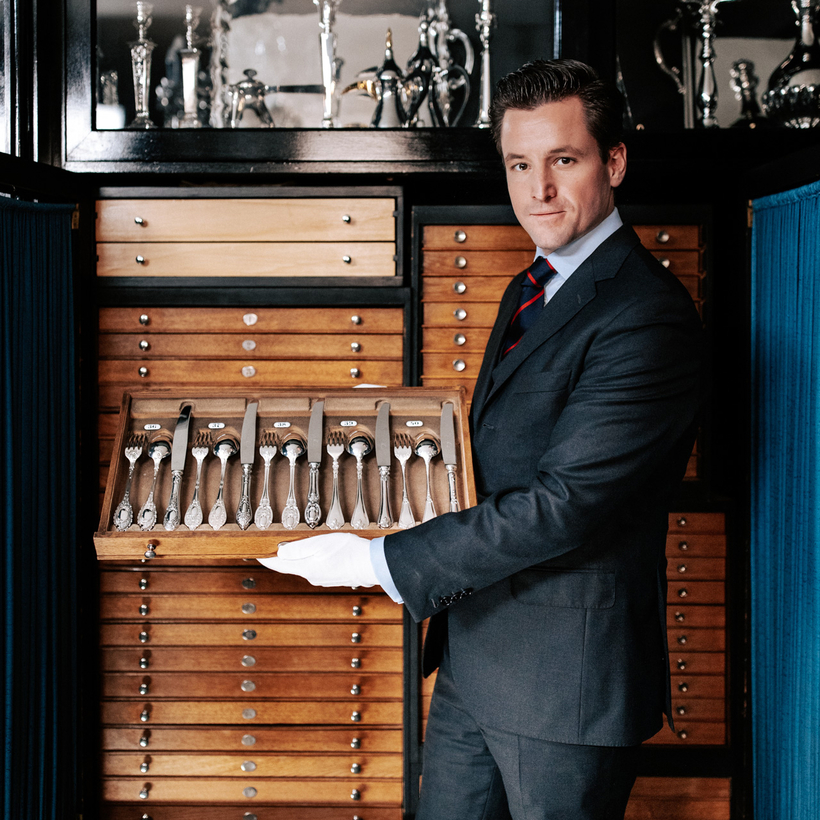It was winter when I first met Jean-Paul Vaugoin, and Vienna was glistening in its pearly gray beauty, a light that had the same silver shimmer as the pieces lining his shop, Jarosinski & Vaugoin.
In the hip neighborhood of Neubau, surrounded by modern boutiques, galleries, and wine bars, the shop, with its early-20th-century storefront and curling typography, stands as a testament to the city’s enduring love affair with hand-rendered beauty. It opened in 1847 and has been on the same street—Zieglergasse—since 1903, when the Vaugoin family merged its business with that of the Jarosinski family. Today, the shop is as recognizable a landmark in the seventh district as the Staatsoper is in the first.

Vaugoin, 40, is the sixth-generation heir to run the business. He grew up with a silver spoon in his mouth, or, more literally, in his hand, testing his adolescent strength—and the nerves of his parents—by bending soft silver coffee spoons and tablespoons in the palm of his hand. “I never understood why my parents got angry, because there were so many spoons in our house,” he tells me.
Vaugoin eventually left home to join the obligatory Austrian military service, and he later enrolled in university to study economics. Things changed when, at age 20, he lost his father. Up until that point, helming the silver production in his hometown had been far from Vaugoin’s mind. “I really hadn’t thought about the business,” he says. “My aim was to be a stockbroker in New York, or at least in London or Singapore.”

Today, it’s silver, rather than stocks, that takes Vaugoin around the world. When we speak months later over Zoom, he’s just returned from London, where he set the table for a coronation dinner given by the Duke of Westminster. His pieces have adorned the tables of the royal families of Qatar and Malaysia and floated on the colorful tablecloths of Palm Beach and Park Avenue doyennes, and they are fixtures in the Kensington Palace apartments of the Prince and Princess of Wales. And hand-delivering is part of the job.
Cabinet of Curiosities
The interior of Vaugoin’s shop has the look of a museum, with drawers and cabinets and cases holding items ranging in price from $50 to $50,000—silver-capped pens, picture frames, goblets, wine coasters, and of course silverware, each piece more beautiful than the last.
Everything is rendered by hand using original equipment by a group of 10 silver-workers, the majority of whom are under 40 and complete a rigorous apprenticeship under the tutelage of a master silversmith. Their age makes them a rarity in the sphere of old-world craft. “Becoming a master in craftsmanship is my aim for my employees,” Vaugoin tells me, adding that he hires people who are committed for the long term.

Together, they produce 200 silverware patterns, original designs spanning from the business’s 19th-century origins to contemporary collaborations with the likes of Giambattista Valli, Thomas Feichtner, and Bodo Sperlein.
Vaugoin has just returned from London, where he set the table for a coronation dinner given by the Duke of Westminster. Hand-delivering is part of the job.
Next month, Vaugoin will drop “Jarosinski” from the business’s name. (The Jarosinski family moved to Brazil in 1929 and hasn’t been a part of the business for the better part of the last century.) He also plans to revert to using an original sans serif typeface reminiscent of his company’s history.

Being young in an old-world business, or making an old-world business young again, is at the center of Vaugoin’s work. Having spent the past 20 years overseeing a business that pre-dates the Austro-Hungarian Empire, it’s difficult to decipher anything other than passion and a deep pride in his work.
And yet, nearly every week someone walks into Vaugoin’s shop asking him to buy their family silver. It’s a sad request he never declines, purchasing antique pieces for a melting price, but, much to the chagrin of his accountant, he usually tucks the pieces away in a cabinet in his shop. “The goal is to not die in beauty,” Vaugoin says. “Tradition ist die Weitergabe des Feuers und nicht die Anbetung der Asche”—or, as he translates into English: “Tradition is not about admiring the ashes. It’s about passing on the fire.”
Madeline Weinfield is a Washington, D.C.–based writer. Her work has appeared in Condé Nast Traveler, The Washington Post, and elsewhere


